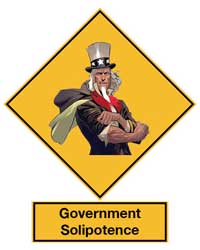Don't we need the State to do X?
If X is a valid function of society, then probably not. Most social functions that modern States have captured can and/or have been done by voluntary society at some time or another. Who will build the roads? People will! Just as they did before governments captured that service. Same for education, hospitals, fire departments, and so on.

The notion that only the government can do X is called "The fallacy of government solipotence." Other than things like taxation and conscription - sugar-coated terms for extortion and slavery - a freed market can do anything the State can do, except more morally (without violence) and probably better.
Anarcho-capitalists envision free market courts, legal systems, and peace officers. The concept of market-generated law is hard for many people to accept, living in a culture where government monopolies dominate. In fact, private and mutual security arrangements prevailed throughout most of human history. Municipal police were virtually unknown until 1830s London. Allowing people to choose their protectors and legal system in a freed market would greatly reduce police brutality, since in such a system people are customers rather than potential criminals. Monopoly police suffer the same problems as any other monopoly - overly expensive and low quality.
Examples of Emergent (Non-Statist) Law
- Anglo-Saxon Common Law
- Law Merchant
- Admiralty Law
- many indigenous "customary law" systems
- Celtic Ireland
- Thing system of classical Iceland
- American not-so-wild west
Naturally there is a lot of explanation and theory about how it might work today and in a future stateless society, in addition to how it has worked in past quasi-anarchist societies.
Books and Treatises
- Power and Market by Murray Rothbard
- The Machinery of Freedom and Law's Order
by David Friedman - Anarchy and the Law - anthology
- The Nature of Law by Roderick Long
- Polycentric Law Links
